Friday, September 15, 2023
9:00 -2:30pm
Viterbo University - Fine Arts Center
900 Viterbo Drive, La Crosse, WI
How serious are concussions? This symposium will focus on the biochemistry underlying traumatic brain injuries, such as those caused by sports accidents or war trauma. Experts in the field will present the latest research on the molecular mechanisms of traumatic brain injuries and their long-term effects on the brain.
On behalf of Viterbo University and the symposium committee, we're grateful you're taking the time to learn with us.
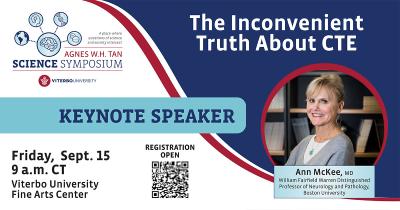
See the schedule of speakers.
Symposium Participant Packet2.51 MB
Schedule for Sept. 15, 2023
| Time | Activity | Speakers | In Person Locations | Virtual Option |
| 8:30–9 a.m. | Welcome Table Open |
Viterbo Fine Arts Center FSPA Lobby |
||
| 9:05– 10 a.m. |
Welcome and Keynote : The Inconvenient Truth about CTE |
Ann McKee, MD |
Viterbo Fine Arts Center - Main Theatre |
|
| 10:10– 11:05 a.m. |
Panel : TBI Recovery: History, Studies and Strategies |
Andrew Jagim, PhD, CSCS*D, CISSN, Sheldon Wagner, MS, ATC, CSCS, ITAT, moderated by Hope Kirwan |
Viterbo Fine Arts Center - Main Theatre | Video. |
| 11:15 a.m.–12:10 p.m. | Break and Visit Booths |
Booths will be listed here. |
Viterbo Fine Arts Center FSPA Lobby |
|
| 12:20–1:15 p.m. | Breakout Session #1 | Mary Kerrigan, DPT, NCS, CWS, Christian Franck, PhD | Viterbo Fine Arts Center FSPA Lobby | |
| 1:25–2:20 p.m. | Breakout Session #2 |
Alecia Gende, DO, CAQSM, FACEP, FAAEM |
Viterbo Fine Arts Center FSPA Lobby | |
| 2:30–3:00 p.m. | Closing reception | Feel free to come and chat with others about the symposium. | Viterbo Fine Arts Center FSPA Lobby |
The closing will be in-person only. |
Keynote Speaker
Ann McKee, MD
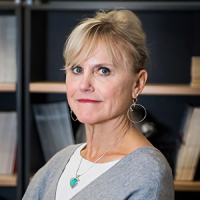
Ann McKee, MD, is William Fairfield Warren distinguished professor of neurology and pathology at Boston University and director of neuropathology for VA Boston. Dr. McKee is a neurologist and neuropathologist whose career focuses on Alzheimer’s disease and chronic traumatic encephalopathy (CTE). Her groundbreaking work on the long-term effects of repetitive head impacts, concussion, and blast injury in contact sports athletes and military veterans revolutionized scientific thought regarding head trauma; she demonstrated that repetitive head trauma can trigger CTE, a devastating neurodegenerative disease. Dr. McKee directs the BU Alzheimer's Disease Research Center and CTE Center. She created the UNITE brain bank, the world’s largest repository of brains from individuals exposed to traumatic brain injuries (over 1350). She is a member of the National Academy of Medicine. McKee was named Bostonian of the Year 2017 by the Boston Globe, one of the 100 Most Influential People in the World and one of the 50 Most Influential People in Healthcare by Time magazine. She received the Henry Wisniewski Lifetime Achievement Award in Alzheimer’s Disease Research by the Alzheimer’s Association and Samuel J. Heyman Service to America Medal (Sammie), Paul A. Volcker Career Achievement Award for outstanding contributions to federal service.
Panel Speakers
Andrew Jagim, PhD, CSCS*D, CISSN
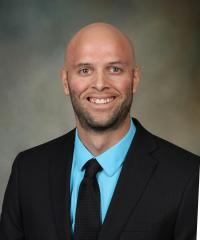
Andrew Jagim is currently the Director of Sport Medicine Research for the Mayo Clinic Health System in La Crosse, Wisconsin, and an Associate Professor of Family Medicine. Dr. Jagim completed his PhD in kinesiology with an emphasis in exercise physiology at Texas A&M University. Andrew is also a certified strength & conditioning specialist with distinction through the National Strength & Conditioning Association and a certified sports nutritionist through the International Society of Sports Nutrition.
His primary research area focuses on how various nutrition and exercise-related strategies influence the performance and health of athletes. Dr. Jagim’s research is also focused on the physiological demands of various sports and tactical professions and how they pertain to injury, recovery status, and performance. This work has led to several publications in peer-reviewed journals, and presentations at national conference events. In addition to his time spent in academia, Andrew has worked as a personal trainer and sports nutrition consultant for a variety of clients and athletes.
Sheldon Wagner, MS, ATC, CSCS, ITAT
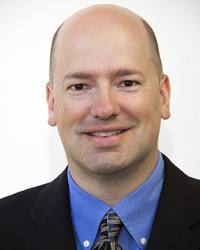
Sheldon Wagner is an associate teaching professor in the College of Science and Health at the University of Wisconsin-La Crosse. He teaches undergraduate Exercise Science courses and in the Master of Science in Athletic Training graduate program.
Wagner served as a staff athletic trainer and lecturer at UWL from 2014-21. Prior to joining UWL, he was employed by Gundersen Lutheran Sports Medicine and was the head athletic trainer at Tomah High School (1996-1999) and Viterbo University (1999-2014). A 2004 recipient of the Viterbo University Servant Leader Award, Wagner earned the honor in recognition of demonstrable servant leader qualities and characteristics in interpersonal relationships, performance, and achievement. He earned his Bachelor of Arts degree from Gustavus Adolphus College (Minn.) in 1994 and his Master of Science degree in Human Performance from UWL in 1995. Wagner also holds credentials as a Certified Strength and Conditioning Specialist and an ImPACT-Trained Athletic Trainer.
He resides in La Crosse with his wife, Faith, and their three children.
Breakout Session Speakers
Alecia Gende, DO, CAQSM, FACEP, FAAEM
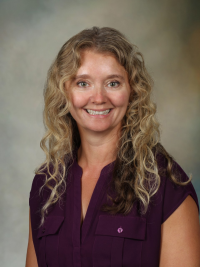
Alecia Gende served as a Nurse Corps Officer in the U.S. Navy prior to entering medical school. She practices emergency medicine and Sports Medicine at Mayo Clinic Health System in La Crosse, WI. Dr. Gende completed her Emergency Medicine training at University of Iowa Hospitals and Clinics. She remained at the University of Iowa for her sports medicine fellowship and has worked as a team physician for football, women's basketball, field hockey, and wrestling squads at the NCAA Division 1 level. She is currently the head team physician for Saint Mary's University in Winona and serving as a team physician for US Ski and Snowboarding Sports Medicine.
Mary Kerrigan, DPT, NCS, CWS
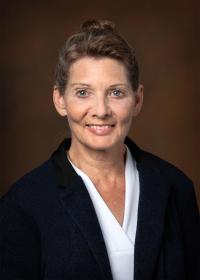
Mary Kerrigan DPT, NCS, CWS is a practicing Neurologic -Vestibular PT at Gundersen Health System for the past 42 years. She is an ABPTS (American Board of Physical Therapy Specialist) Board certified Neurologic Clinical Specialist since 1997 and has both Basic and Advanced Certification in Vestibular Rehabilitation (Herdman and Emory) since 2001. She has been an adjunct professor at the University of Wisconsin-La Crosse, teaching Neurology, Vestibular assessment and treatment, and Integument. She is the recipient of the APTA Wisconsin Clinical Excellence Award in 1999 and the Excellence in Teaching Award from the University of Wisconsin-La Crosse in 2000. She and colleagues published “Prevalence of BPPV in the Young Adult Population”. PM R 2013; 5:778-785 and they have ongoing research “Prevalence of BPPV in the Young adult population after mTBI” in process. Her passion is excellence in patient care to identify the root cause and treatment of central vs peripheral vestibular disorders.
Christian Franck, PhD
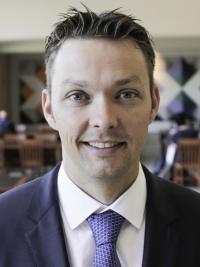
Franck is an expert on cellular biomechanics and Traumatic Brain Injury. His lab investigates critical injury thresholds and molecular root causes of brain injury. He is also the acting director of the Panther program, a multi-institutional consortium aimed at traumatic brain injury prevention and detection.
Hope Kirwan
Wisconsin Public Radio
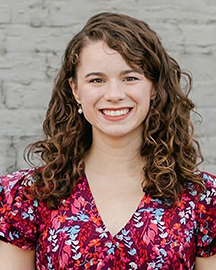
Hope Kirwan has been Wisconsin Public Radio’s La Crosse reporter since 2015. Her stories can be heard almost daily on WPR’s newscasts, covering agriculture issues and southwestern Wisconsin. Before joining WPR, Kirwan was a reporter for public radio station KBIA in Columbia, Mo., where she earned several awards, including a National Edward R. Murrow Award. Kirwan received her bachelor’s degree in journalism from the University of Mo.
Title: Assessment and Treatment of Dizziness: The Primary Symptom of a Prolonged Recovery from Concussion.
Presenter: Mary Kerrigan DPT, NCS, CWS
Session Description:
“Dizziness at the time of injury was associated with a 6.34 times increased risk of a protracted recovery from concussion” was published by Lau and colleagues in 2011. Wang and associates in 2021 did a retrospective review of 103 patients with concussions. Patients were evaluated at an average of 18.8 weeks (SD, 16.4 weeks) after the injury. Benign Paroxysmal Positional Vertigo (BPPV) was diagnosed in one-third of the subjects.
This session will focus on presenting the normal vestibular anatomy, and vestibular impairments after a concussion, presenting the findings of our current research on the prevalence of BPPV after mTBI in the young adult population. Early assessment and treatment of BPPV can decrease the prolonged recovery from mTBI/concussion.
Learning Objectives:
- Understand the normal anatomy and function of the Vestibular system
- Understand the impairments of the central and peripheral vestibular system after mTBI/concussion
- Appreciate the benefits of early evaluation and treatment of BPPV to improve the timely recovery from mTBI/concussion
The Cellular Biomechanics of TBIs
Presenter: Christian Franck, PhD
Description:
We will explore the fundamental concepts of primary and secondary injuries associated with traumatic brain injuries (TBI) and concussions, shedding light on the critical beginnings of these injuries. Our discussion will be centered around the intriguing research conducted in our lab, where we employ advanced three-dimensional microscopy techniques to unravel the mysteries of neuron deformation in traumatic brain injuries. The Franck Lab is renowned for its expertise in cellular biomechanics and its pioneering use of cutting-edge experimental mechanics techniques, all conducted at the micro and nanoscale. Throughout this presentation, we will provide you with valuable insights into our research methodologies and the compelling motivations that drive our endeavors. Join us on this journey to uncover the secrets of traumatic brain injuries and gain a deeper understanding of the crucial early stages of these complex injuries.
Learning objectives:
- Comprehend the distinctions between primary and secondary injury in TBI/concussions.
- Knowledge of advanced microscopy techniques.
- Develop an appreciation for interdisciplinary approaches in research.
- Acquire insight into how cells respond to mechanical forces.
Title: I'm ready to play, today! Returning to play after a sports related concussion
Presenter: Alecia Gende, DO, CAQSM, FACEP, FAAEM
Session Description: Have you ever had or known someone who has had a concussion? Our thoughts and management of sports-related concussions have evolved a lot over the recent years. We will discuss diagnosis and management of sports-related concussion and specifically get into the new developments of returning to play after a concussion. Out with the old “don’t do this” and in with the new “get up and do this!”
Learning Objectives:
- Discuss mechanism and diagnosis of sports-related concussion
- Discuss common symptoms of concussion and why they occur
- Review return to play protocol and updates in sports-related concussion recover
